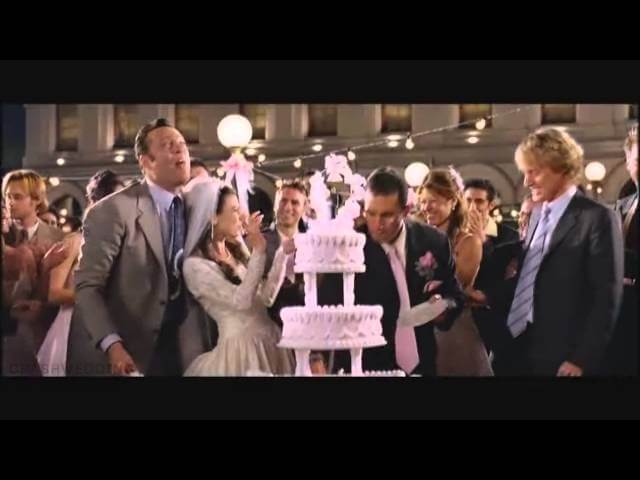Casting was crucial for this. The film hinges on the comic repartee of stars Owen Wilson and Vince Vaughn, but also features a slate of then-unknown talents like Isla Fisher, Bradley Cooper, and Rachel McAdams, as well as well-placed supporting spots from Jane Seymour and Christopher Walken. Director David Dobkin insisted upon several weeks of rehearsals, during which improvisation and actor input was considered and then put into a rewritten script. Another week or more of production time was put into the opening montage set to “Shout!” which Dobkin says was structurally crucial:
That was important not just for pacing, but to create a sense of genuine love of weddings among the crashers—because otherwise, those guys are creeps. Dobkin continues:
There was a big concern [before production started] from the marketing department, who sat me down and said, “I don’t know how we’re going to [sell] this movie—these guys are predators.” I had just never thought of it that way. They said, “They’re going to these weddings, lying about who they are and doing all this stuff to get these girls to sleep with them.”
“No, you don’t get it,” I responded. “They love weddings, authentically. They like the free food, they like the music and the bands, they like the dancing and the kids, they like talking to the grandparents. These guys make the weddings better. You would want them to crash your wedding.”
That’s the distinction. It’s not misogynistic and, in fact, what it’s doing is replicating a real seduction, which is, “I want to go to bed with you, but I have all these walls up. Can you make me laugh, make me attracted to you and find a way to make this really fun so we could get to the good part?” That’s a seduction. So, if I can seduce the audience—if I can make them laugh and be entertained and think these are okay guys—by the time they’re dropping the girls in the bed, it’s a magic trick. That was the whole idea.
It’s hard to imagine that playing well today, but the movie’s star has steadily risen as its imitators have multiplied. The possibility of a sequel has been floated numerously in the intervening years, which Dobkin addresses in the oral history’s conclusion:
I’ve been involved [with talks about a sequel] since the beginning. [The studio] calls me every year. For a long time, there was nothing to do but make the same movie, and I wasn’t going to do that. I should’ve done that, because then I wouldn’t have to work again, but I didn’t want to. None of us really wanted to [do a sequel] unless there was a great idea. Then, about a year and a half ago, a light bulb went on in my head, and I sat down with Vince and Owen about it, and we all liked it. That’s in development now. We’ll see how it comes out. If it comes out really, really good, we’ll take a swing. There’s no reason not to. Those characters are beloved by us. We’re not making it for an audience; we have to make it for ourselves and then hope it works for everybody again.
You see, I had this moment of hitting 45 [a couple years ago] and going, “Oh, what happens when this and this happens…?” [The sequel] came from the [same] emotional story of what it means to be a man at [a certain] age and in certain situations and having to go back out into the world. It has a relevant, real story in the middle of it—you can then build the comedy around that. [With Wedding Crashers], it was about being 35 and having to come of age and going, “Wait, how much longer am I going to have to wait before I get going with love and life and monogamy and marriage?” So, we had a little bit of an exploration of that conversation. There’s another conversation happening right now that I think is just as relevant.
Check out the whole thing for numerous insights on how they evaded an NC-17 rating and the mysterious, almost spectral on-set presence of Christopher Walken.

 Keep scrolling for more great stories.
Keep scrolling for more great stories.
